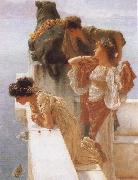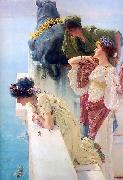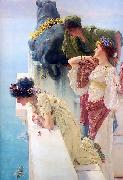Wholesale Oil Painting No Minimum |
|||||||||||
|
|
|||||||||||

|
|||||||||||
|
|
|
||||||||
Alma-Tadema, Sir Lawrenceb.Jan. 8, 1836, Dronrijp, Netherlands. d.June 25, 1912, Wiesbaden, Germany. Painter and designer of Dutch birth. The son of a notary, Alma-Tadema demonstrated an early artistic ability. In 1852 he entered the Antwerp Academy, where he studied under Gustaf, Baron Wappers, and Nicaise de Keyser. An important influence at this time was Louis De Taye, Professor of Archaeology at the academy and a practising artist. Alma-Tadema lived and worked with De Taye from 1857 to 1859 and was encouraged by him to depict subjects from the early history of France and Belgium. This taste for historical themes increased when Alma-Tadema entered Baron Henri Leys studio in 1859 and began assisting him with his monumental frescoes for the Antwerp Town Hall. While in Leys studio, Alma-Tadema produced several major paintings, for example the Education of the Children of Clovis (1861; ex-Sir John Pender priv. col., see Zimmern, p. 3) and Venantius Fortunatus Reading his Poems to Radagonda (1862; Dordrecht, Dordrechts Mus.), which are characterized by their obscure Merovingian subject-matter, rather sombre colouring and close attention to detail. |
||||||||
|
|
||||||||
A Coign of Vantage
A Coign of Vantage Painting ID:: 40848 |
mk156
1895
Oil on canvas
64.2x45cm
mk156 1895 Oil on canvas 64.2x45cm |
|||||||
|
|
||||||||
Sir Lawrence Alma-Tadema,OM.RA,RWS1836-1912 |
||||||||
|
|
||||||||
|
|
A coign of vantage
A coign of vantage Painting ID:: 72057 |
1895(1895)
Oil on canvas
cjr
1895(1895) Oil on canvas cjr |
||||||
|
|
||||||||
Laura Theresa Alma-Tadema(1852 C 15 August 1909 in Hindhead) was from 1871 the second wife of the painter Lawrence Alma-Tadema and a painter in her own right. A daughter of Dr George Napoleon Epps (who was brother of Dr John Epps), her two sisters were also painters (Emily studied under John Brett, a Pre-Raphaelite, and Ellen under Ford Madox Brown), whilst Edmund Gosse and Rowland Hill were her brothers-in-law. It was at Madox Brown's home that Alma-Tadema first met her in December 1869, when she was aged 17 and he 33. (His first wife had died in May that year.) He fell in love at first sight,and so it was partly her presence in London (and partly the fact that only in England had his work consistently sold) that influenced him into relocating in England rather than elsewhere when forced to leave the continent by the outbreak of the Franco Prussian War in July 1870. Arriving in London at the beginning of September 1870 with his small daughters and sister Artje, Alma-Tadema wasted no time in contacting Laura, and it was arranged that he would give her painting lessons. During one of these, he proposed marriage. As he was then thirty-four and Laura was now only eighteen, her father was initially opposed to the idea. Dr Epps finally agreed on the condition that they should wait until they knew each other better. They married in July 1871 and, though this second marriage proved childless, it also proved enduring and happy, with Laura acting as stepmother to her husband's children by his first marriage. The Paris Salon in 1873 gave Laura her first success in painting, and five years later, at the Paris International Exhibition, she was one of only two English women artists exhibited. |
||||||||
|
|
||||||||
|
|
A coign of vantage
A coign of vantage Painting ID:: 73564 |
Date 1895(1895)
Medium Oil on canvas
cyf Date 1895(1895) Medium Oil on canvas cyf |
||||||
|
|
||||||||
|
Laura Theresa Alma-Tadema (1852 C 15 August 1909 in Hindhead) was from 1871 the second wife of the painter Lawrence Alma-Tadema and a painter in her own right. A daughter of Dr George Napoleon Epps (who was brother of Dr John Epps), her two sisters were also painters (Emily studied under John Brett, a Pre-Raphaelite, and Ellen under Ford Madox Brown), whilst Edmund Gosse and Rowland Hill were her brothers-in-law. It was at Madox Brown's home that Alma-Tadema first met her in December 1869, when she was aged 17 and he 33. (His first wife had died in May that year.) He fell in love at first sight,and so it was partly her presence in London (and partly the fact that only in England had his work consistently sold) that influenced him into relocating in England rather than elsewhere when forced to leave the continent by the outbreak of the Franco Prussian War in July 1870. Arriving in London at the beginning of September 1870 with his small daughters and sister Artje, Alma-Tadema wasted no time in contacting Laura, and it was arranged that he would give her painting lessons. During one of these, he proposed marriage. As he was then thirty-four and Laura was now only eighteen, her father was initially opposed to the idea. Dr Epps finally agreed on the condition that they should wait until they knew each other better. They married in July 1871 and, though this second marriage proved childless, it also proved enduring and happy, with Laura acting as stepmother to her husband's children by his first marriage. The Paris Salon in 1873 gave Laura her first success in painting, and five years later, at the Paris International Exhibition, she was one of only two English women artists exhibited. A coign of vantage Date 1895(1895) Medium Oil on canvas cyf |
||||||||
|
|
||||||||
|
Prev Next
|
||||||||
|
|
||||||||
|
Related Paintings to Laura Theresa Alma-Tadema :. |
||||||||
|
|
||||||||
|
CONTACT US |



